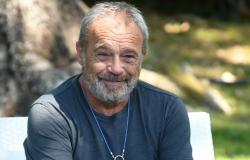Philippe Leroy died this evening in Rome. The French actor had been ill for some time. With Philippe Leroy a legend leaves, an authentic character beyond the cinema despite almost 200 appearances in films and dramas from “The Hole” by Jacques Becker (1960) to his latest successes as Terence Hill’s Bishop in the fiction “Don Matteo” and his last farewell on the big screen with «The night is small for us» by Francesco Lazotti in 2019.
Born in Paris on 15 October 1930 as Philippe Leroy-Beaulieu, heir to an aristocratic family with six generations of soldiers and ambassadors behind him, disdainful of his title of marquis, he went to school with the Jesuits, and at just 17 years of age he embarked as a cabin boy on a ship to America like a Joseph Conrad character. In fact, once he returned home he ended up in the Foreign Legion and went to fight in Indochina and Algeria, enlisted as a paratrooper even though he never jumped out of a plane until he was 50. He returns from Algeria with the rank of captain and medals on his chest (two legion of honor and a cross for valor), but he soon understands that it is better to find a job, even at the circus (he worked with horses) or a bobsled pilot or navigator on off-shore boats. A relative helps him to taste the atmosphere of cinema and Jacques Becker – struck by his lean physique, the look of someone who has seen danger up close and knows weapons – enlists him in the cast of his prison film which gives him an unexpected worldwide success. However, the air in France is heavy on the eve of Algerian independence and Leroy, having just turned 30, understands that it is better for him not to stay. Thanks to the favorable climate of film co-productions between Italy and France he crosses the border and uses the little knowledge he accumulated in Paris to obtain some roles as an actor. Vittorio Caprioli and Franca Valeri, whom he met in the theater, help him and it is Caprioli who offers him a role in «Leoni al sole» (1961) taking advantage of his second talent: perfect manners, aristocratic bearing, natural air of a gentleman. For both of them it is a sort of debut, but the young Frenchman has many strings to his bow and is “adopted” at Cinecittà.
«From that moment on – he said – French cinema forgot me, but on the other hand I was adopted by Italian cinema which treated me like a son. But I have never really been part of your cinema, I have always felt like an amateur, despite a number of roles and many experiences with the best masters.” From the adventurous Riccardo Freda to the busy Giancarlo De Bosio, from his friend Gianni Puccini (almost a pygmalion) to the popular Luigi Zampa, always finds a suitable role, often as a cruel and cold “villain”. Then the stroke of luck in 1965 with «Seven men of gold» by Marco Vicario. In the role of the mastermind of a gang of robbers, alongside the beautiful Rossana Podestà and Gastone Moschin, he made the film the box office champion of the year which will also lead to a sequel. It becomes his passport for a profession that does not resemble him but which will instead make him a double and recurring figure in Italian cinema: refined gentleman on the one hand, ruthless and cruel antagonist on the other.
Television will be another thing for him, an instrument of popular consensus that offered him the second turning point in his career in 1971: Renato Castellani summoned him and put him in the shoes of Leonardo da Vinci in the drama of the same name. His temperament was finally reunited, 5 years later, with his profession: in the role of the phlegmatic Portuguese Yanes de Gomera in Sergio Sollima’s «Sandokan» he became a true star and sculpted an unforgettable Salgarian incarnation, loved by 30 million spectators episode. Although he had tried his hand at theatreeven though he had also acted for Godard, Comencini, Luigi Magni, Jacques Deray, Dario Argento, Luc Besson, even though he had played the roles of priests (Ignazio de Loyola in «State Migliore Se Pot»), officers («RAS» in Yves Boisset), ex-Nazi (“Night Porter” by Liliana Cavani), it was TV that offered him the best roles.
It is right to remember him at least in «Quo vadis?», «The General», «Elisa di Rivombrosa», «Inspector Coliandro» and even «I Cesaroni». But his real life was increasingly outside the set: after turning 50 he finally embraced his passion for skydiving and will be remembered for over 2000 jumps until he was 80. Again in 2011 he was an observer in Afghanistan in the Italian contingent: “Parà among para i para” as he remembered with amused pride. Otherwise he happily stayed at home, writing poetry, painting, designing his furniture. «I have built five houses with my own hands. In the last one – he remembered at the age of 90 – an enchanted village on the Via Cassia where I lived with my wife Silvia (daughter of Enzo Tortora, mother of two beloved children, who passed away in 2022) and with my family, there is no piece of plastic, but all furniture and wooden objects that I worked on, piece by piece. Like my life…”. With him goes the austere and ironic protagonist of a season of cinema and history. Philippe Leroy was a myth with his hoarse and sly voice, his physique sculpted like an ancient olive tree, the elegant detachment with which he told his life as a Conradian hero.





